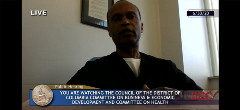Health Equity
Medicaid Enrollment Touches 39% of the Residents of The District of Columbia; DC’s 70/30 FMAP is Vital for the Maintenance of Health & Human Services
A reduction in the District’s FMAP would not lead to long-term government savings and would have a ripple effect throughout the entire health system in the DMV, crippling access to care for not only Medicaid beneficiaries but also all those who live, work, and visit the District of Columbia, including members of Congress and their staffs.
.png?sfvrsn=9ac2d21b_0)
Why does DC receive an Enhanced FMAP Rate?
The DC FMAP rate of 70% established by the Revitalization Act resulted from bipartisan analysis, discussion, and negotiation by Congressional leadership aiming to balance fairness with the District’s restricted ability to generate revenue. Congress recognized that the District of Columbia faces unique financial challenges due to its non-state status and the significant amount of federally-owned land within its boundaries. The District is unable to tax non-residents’ earnings, so these workers pay no taxes to support the infrastructure and services, such as roads, public safety and emergency services that they benefit from in the District. The District is also unable to tax up to 40% of the real property within its borders due to statutory restrictions.
Why are we concerned about DC's FMAP now?
Members of Congress have proposed reducing the DC FMAP to the statutory minimum for all other states, which is currently 50% (but could be reduced even more). Such a change would impact every physician and every practice, regardless of type, location, and payers contracted. Even practices who take no insurance will not be able to send patients for specialist care, hospital admissions, or other types of care.
What can MSDC members do?
- If you know a member of Congress or staffer, reach out to them and share how DC cuts will hurt your patients.
- Share your relationships and outreach with hay@msdc.org so we can help coordinate advocacy efforts.
- Email hay@msdc.org if you would like to be paired with a physician member of Congress office and trained by MSDC staff on how to reach out.
Resources
- DC FMAP cut fact sheet
- California Medical Association fact sheet on Medicaid cuts
- MSDC and healthcare association letter to Congress arguing against DC FMAP changes.
- MSDC original story on Medicaid changes.
News, Statements, and Testimony on Health Equity Issues
MSDC Past President Julian Craig Testifies on New Ward 8 Hospital

Today, MSDC past president and current Board member Julian Craig, MD, testified on behalf of the Society during a hearing for the contract for the new St. Elizabeth's hospital.
Dr. Craig began by stating MSDC's support for the hospital and GW, as well as thanking Deputy Mayor Turnage, the Council, and the Mayor for their work in finalizing a hospital contract and partnering with UHS and GW to run the hospital.
However, he noted that a comprehensive healthcare system in Wards 7 and 8 must be more than the new hospital. "What will become of local physician practices?" Dr. Craig asked. "A comprehensive healthcare system requires not only a world class hospitals, but also independent physician practices." He noted that a system of hospital based, affiliated, and independent practices in the same area already exists in the District in and around Sibley Hospital.
Dr. Craig (and the Medical Society) made three recommendations to the Council on how to maintain a physician network in Wards 7 and 8 with the new hospital:
- "For those physician practices that want to affiliate with or support the hospital - we ask that UHS and the District ensure space is available to them in the new Medical Office Buildings, and have a preferential rental agreement for these affiliated practices."
- "UHS should offer preferential hiring to local physicians who are interested in working for UHS and GW.."
- "The District should support physicians to be able to create and maintain viable independent practices in Ward 7 and 8. Last month MSDC shared just how the District can do this – tax relief for building or purchasing office space, grants or loan programs for local practices, increased Medicaid reimbursement, and student loan forgiveness programs to ensure graduating physicians can establish or takeover practices that already exist in the District."

Leave a comment